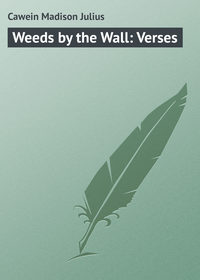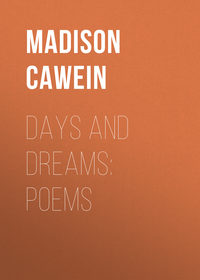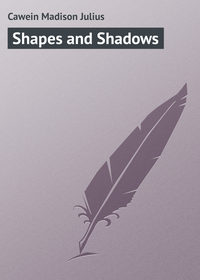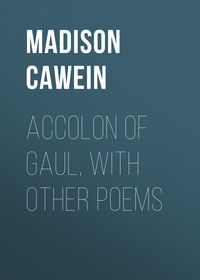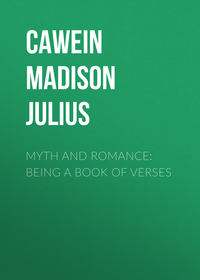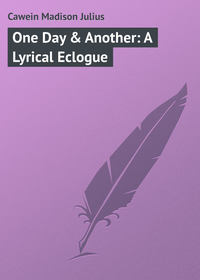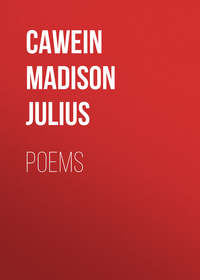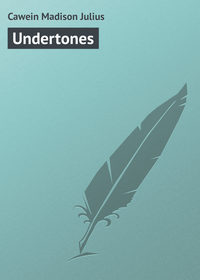The Poems of Madison Cawein. Volume 2 (of 5)
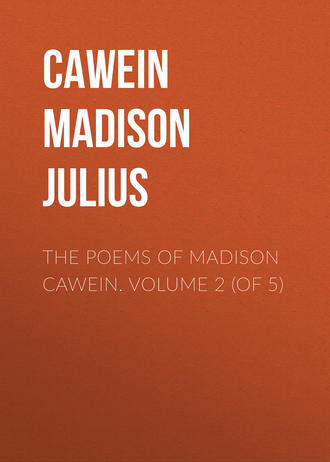 полная версия
полная версияThe Poems of Madison Cawein. Volume 2 (of 5)
Жанр: зарубежная поэзиязарубежная классиказарубежная старинная литературастихи и поэзиясерьезное чтениеcтихи, поэзия
Язык: Английский
Год издания: 2018
Добавлена:
Настройки чтения
Размер шрифта
Высота строк
Поля
XI
“Confronted with the certainty that IHad no approval for my love from you,No visible sign, but my own prompting hope’s,Conforming with my heart’s one wild desire,Who had not dreaded disappointment there!The shadow of a heart’s unformed denial,That should take form and soon confirm the doubt:The doubt that would content itself with this:If I might hold her by the hand,—Her hands so full of soothing peace!—Her heart would hear and understandMy heart’s demand,And all her idling cease.If she would let my eyes look inHer eyes, whose deeps are full of truth,Her soul might see how mine would winHer, without sin,In all her happy youth.If I might kiss her mouth, and leadThe kiss up to her eyes and hair,There is no prayer that so could plead,—And find sure heed,—My love’s divine despair.XII
“And, uninstructed, smiled and wrote ‘despair,’Enamoured, yet fearful of the shade that shouldSome day come stealing through my silent doorTo sit unbidden through the lonely hours.—I cast the shudder off, and in the fieldsFound hope again, and beauty born of dreams:For it was summer, and all living things,The common flowers and the birds and bees,Became interpreters of love for me:Say that he can not tell her how he loves her—Words, for such adoration, often fail,—When but a bow of ribbon, glove that gloves her,Clothes her fair femininity in mail.So many ways and wisdoms to express whatTo th’ language of devotion is denied;Ambassadors to make the maiden guess whatBefore her heart’s high fortress long has sighed.A bird to sing his secret—she’ll perpend him:A bee to bid her soul to hear and see:A blossom, like a sweet appeal, to bend him,Before her there, upon a worshiping knee.XIII
“So was my love confessed to you. I thoughtYou loved me as love led me to believe:And so, no matter where I, dreaming, wentAmong the hills, the woods, and quiet fields,All had a poetry so intimate,So happy and so ready that, for me,’Twas but to stoop and gather as I went,As one goes reaching roses in the June.Three withered wild ones that I gathered thenI send you now. Their scent and bloom are dust:1
What wild-flower shows perfectionSuch as thy face, no blemish mars?I leave to the selectionOf all the wild-flower stars:To every wildwood bloom that blows,Wild phlox, wild daisy, and wild rose.What cascade hath suspicionO’ the marvel that thy whiteness is?I leave to the decisionOf each proclaiming breeze:To winds that kiss the buds awake,And roll the ripple on the lake.What bird can sing the namingOf all the music that thou art?I leave to the proclaimingOf that within my heart:My heart, wherein, the whole day long,Sits adoration rapt in song.2
What witch then hast thou met,Who wrought this amulet?This charm, that makes each look, love,Of thine a rose;Thy face an open book, love,Where beauty gleams and glows,And thought to music set.What fairy of the wood,To whom thou once wast good,Gave thee this gift?—Thy words, love,Should be pure gold;And all thy songs as bird’s, love,Sweet as the Mays of oldWith youth and love imbued.What elfin of the gladeThis white enchantment made,That filled thee with the essenceOf all the Junes?That made thy soul, thy presence,Like to the moon’sAbove a far cascade.What wizard of the caveHath made my heart thy slave?That dreams of thee when sleeping,And, when awake,My anxious spirit keeping’Neath spells I can not break,Sweet spells, whence naught can save.3
Dear, (though given conclusion to),Songs,—no memory surrenders,—Still their music breathe in you;Silence meditation rendersAudible with notes it knew.Sweet, when all the flowers are dead,Perfumes,—that the heart remembersMade of them a marriage-bed,—Shall not fail me in December’sGloom, but from your face be shed.Dear, when night denies a star,Darkness will not suffer, seeingSong and fragrance are not far;Starlight of the summer beingIn the loveliness you are.XIV
“Revealing distant vistas where I thoughtI saw your love stand as ’mid lily blooms,Long, angel goblets molded out of stars,Pouring aroma at your feet: and lifeTook fire with thoughts your soul must help you read:A song; and songs (who does not know?)Reveal no music but is thine.Thou singest, and the waters flow,The breezes blow,The sunbeams shine,And all the earth grows young, divine.Low laughter; and I look away;Whate’er the time of year, I dreamI walk beneath sweet skies of MayOn ways where playBoth gloom and gleam,And hear a bird and forest stream.A thought; and straight it seems to me,However dark, the stars arise,And rain down memories of thee,—As, it may be,From ParadiseOne feels an angel-lover’s eyes.XV
“But is it well to tell you what I feltWhen I beheld no change beyond the moodsThat gloomed or glistened in your raven eyes?When I sat singing ’neath one steadfast starOf morning with no phantoms of strange fearsTo slay the look or word that helped me sing:When song came easier than come buds in spring,That make the barren boughs one pomp of pearls:Oh, let the happy day go past,And let the night be short or long,When life and love are one at last,And hearts are full of song,’Tis sweet midsummer of the dream,And all the dreams thou hastAre truer than they seem.And once I dreamt in autumn ofDeath with cadaverous eyes that gazedFrom out a shadow.... It was loveWhose deathless eyes were raisedFrom the deep darkness that unrolledWild splendor; and, amazed,Thy soul I did behold.And then it seemed that some one said,The dead are nearer than dost know.And when they tell thee love is dead,—Although it seems ’t is so,—Still shalt thou feel in every beatAnd heart-throb of thy woeLove breathing, bitter-sweet.XVI
“One evening when I came to talk with you,Impatience hurt me in your brief replies.And I who had refused,—because we dreadApproaching horror of our lives made maimed,—The inevitable, could not help but seeSome change in you to’ards me.—That night I dreamedI wandered ’mid old ruins, where the snakeAnd scorpion crawled in poison-spotted heat;Plague-bloated bulks of hideous vine and rootWrapped fallen fanes; and bristling cacti bloomedBlood-red and death-white on forgotten tombs.And from my soul went forth a bitter cryThat pierced the silence that was packed with deathAnd pale presentiment. And so I went,A white flame beckoning before my face,And in my ears sounds of primordial seasThat boasted preadamic gods and men:A flame before me and, beyond, a voice:But, lo, the white flame when I reached for itBecame thin ashes like a dead man’s dust;And when I thought I should behold the sea,Stagnation, turned to filth and rottenness,Rolled out a swamp: the voice became a stench.If we should pray together nowFor sunshine and for rain,And thou shouldst get fair weather now,And I the clouds again,Would ray and rain keep single,Or for the rainbow mingle?Dear, if this should be made to me,That I had asked for light,And God had given shade to me,And all to thee that’s bright,Wouldst thou go by with scorning,Refusing darkness morning?If all my life were winter, love,And all thy life were spring,And mine with frost should splinter, love,While thine with birds should sing,Wouldst thou walk past and glitter,Forgetful mine is bitter?XVII
“Still on the anguish of a dying hopeAn infant hope was nourished; all in vain.For, at the last, although we parted friends,The friendship lay like sickness on my soul,That saw all gladness perish from the worldWith loss of thee; and, ’mid the future years,Love building high a sepulchre for hope.Ah, could you learn forgetfulness,And teach my heart how to forget;And I unlearn all fretfulness,And teach your soul that still will fret;The mornings of the world would burnBefore us and we would not turn,For we would not regret.Did you but know what sorrow keeps,That drives the joy of life away,And I what each to-morrow keepsFor us until it is to-day;No grief or change would then surpriseOur lives with what our lives were wise,And nothing could betray.If you could be interior toMy dreams that are all love’s desire;And I could be superior toMyself and such in you inspire;Long stairways would the years unrollTo lift us upward, soul to soul,To what celestial fire!XVIII
“There came no words of comfort from your lips.Not that I asked for pity! that had beenAs fire unto the scalded or dry breadUnto the famished fallen ’mid the sands!But all your actions said that I was wrong,But how, I know not and have ceased to care;Still standing like one stricken blind at noon,Who gropes and fumbles, feeling all grow strangeThat once was so familiar; cursing GodWho locks him in with darkness and despair.—Your judgment had been juster had it hadA lesser love than mine to judge.—O love,Where lay the justice of thy judge in this?—‘If thou hadst praised thy God as longAs thou hast praised a woman’s eyes,Perhaps thou hadst not suffered wrong,As now, and sat with sighs:But, through thy prayer and praise made strong,Perhaps thou hadst grown wise.‘If thou hadst bade thy God be moreThan I, thy life had not been sad;His love to thee had not been poorAs mine. But thou wast mad,And cam’st, a beggar, to my door,And had more than I had.‘If thou hadst taught me how to love,Nor played with love as monarchs play,My heart had learned right soon enough,From thine, love’s lowlier way.But all thy love stood far above,Nor touched my soul to sway.’XIX
“Thus did you write me, or in words like these,When all was over and your heart was led,Through pity, haply, thus to justifyYourself, that needed not to justify,Since all your reason lay in four small words,Enough to wreck my world and all my life,You did not love: what more is there to tell?—Yet, haply, it was this: One soul, that stillDemanded more than it could well return;And, searching inward, yet could never pierceBeyond its superficiality.You did not know; yet I had felt in meThe rich fulfillment of a rare accord,And could not, though the longing lay like songAnd music on me, win your soul’s response.Were it well, lifting meEyes that give heed,Down in your soul to seeThought, the affinityOf act and deed?Knowing what naught may tellOf heart and soul:Yet were the knowledge whole,And were it well?Were it well, giving trueLove all enough,Still to discover newDepths of true love for you,Infinite love?Feeling what naught may tellOf heart and soul:Yet were the knowledge whole,And were it well?XX
“What else but, laboring for some good, to liftOurselves above the despotism of self,All egoism strangling strength and hope,To work and work, and, in the love of work,Which takes the place, in some, of love’s real self,To quench the flame that eats into the heart?Art, our intensest and our truest love,Immaculateness that has never ledOne of her lovers wrong, his love all soul!I followed beauty, and my ardor prayedYour memory would, feature and form and face,Be blotted out within me; rise no moreTo mar the labor that I owed to Art.I prayed, yea, to forget you, you I loved:I prayed; and, see!—how Heaven answered me:I have no song to tell theeThe love that I would sing;The song that should enspell theeWith words, and so compel theeThat thou, with love, must wingInto my life to-morrow—For all my songs are sorrow.My strength is not a giantTo hold thee with strong hands,To make thee less defiant;Thy spirit more compliantWith all my love demands:Alas! my love is meekness,And all my strength is weakness.What hope have I to hover—When wings refuse to rise—Within thy heart’s close cover,And there to play the lover,Concealed from mortal eyes?What hope! to give me boldness,When all thy looks are coldness?XXI
“I prayed; and for a time felt strong as strength,And held both hands out to the lovelinessThat lured in the ideal. And I feltCompelling power upon me that would liftMy face to heaven, now, to see the stars,Now bend it back to earth to see the flowers.I learned long lessons ’twixt a look and look:Breezes and linden blooms,Sunshine and showers;Rain, that the May perfumes,Cupped in the flowers:Clouds and the leaves that patterRaindrops that glint and glare—Or be they gems that scatter?Sapphires the sylphides shake,When their loose fillets break,Out of their radiant hair?Now is my heart a lute!Now doth it pinionSong in love’s swift pursuitIn thought’s dominion!Dreaming of all thou meanest,Thou, with uneager eyes,Nature! of worlds thou queenest,Whither thy mother handDraws us from land to land,Far from the worldly wise!XXII
“Thus would I scatter grain around my life,Gold grain of song, to lure them down to me,Cloud-colored doves of peace to fill my soul,And find them turn to ravens while they flew,Black ravens of despair that would not out.The old, dull, helpless aching at the heart,As if some scar had turned a wound again.While idle grief stared at the brutal past,Which held a loss that made the past more richThan all Earth’s arts: that marveled how it cameSuch puny folly should usurp love’s highProud pedestal of life that held your form,In Parian, sculptured by the hands of thought.And oft I shook myself,—for nightmares weighedEach sense,—and seemed to wake; yet evermoreBeheld a death’s-head grinning at my eyes.So when the opening of the door doth thrillMy soul with sudden knowledge death is come,Let me forget you or remember still,It will not matter then that life went ill,When death bends to me and my lips are dumb.Then I shall not remember: and shall leaveNo memory behind me, and no traceOf aught my life accomplished. Let none grieve.There is no heart my passing will bereave;And there are thousands who can fill my place.Who knocks?—The night camps on each hill and heath:And round my door are minions of the night:And like a weapon, riven from its sheath,The wind sweeps, and the tempest grinds its teethAround me and my wild, hand-hollowed light.Who knocks?—the door is open!—And I seeThe Darkness threatening, with distorted fistsOf cloudy terror, Courage on her knee:Shine far, O candle! for it so may beLove is bewildered in the night and mists.—No wandering wisp art thou, that haunts the rainWith pallid flicker, fading as it flies!—The door is open!—Will he knock again?—The door is open!—Shall it be in vain?—Come in! delay not! thou, whose ways are wise!Who knocked has entered: let the darkness pass,The door be closed!—Now morning lights shall thrustIt open; and the sunlight shine and massIts splendor here where once but darkness was,And in its rays—motes and a little dust.”XXIII
And I had read, read to the bitter end;Half hearing lone surmises of the rainAnd trouble of the wind. At last I roseAnd went to Gwendolyn. She did not knowThe kiss I gave her had a shudder in it;Nor how the form of Julien rose betweenMe and her lips, a blood-stain o’er his heart.THE IDYLL OF THE STANDING-STONE
I
She knows its windings and its crooks;The wildflowers of its lovely woods;The crowfoot’s golden sisterhoods,That crowd its sunny nooks:The iris, whose blue blossoms seemMab’s bonnets; and, each leaf a-gleam,The trillium’s fairy-books.He knows its shallows and its pools,Its stair-like beds of rock that go,Foaming, with waterfall and flow,Where dart the minnow schools;Its grassy banks that herons haunt,Or where the woodcock call; and gauntThe mushrooms lift their stools.She seeks the columbine and phlox,The bluebell, where the bushes fillThe old stones of the ruined mill;She wades among the rocks:Her feet are rose-pearl in the stream;Her eyes are bluet-blue; a beamLies on her nut-brown locks.He comes with fishing-reel and lineTo angle in the darker deeps,Where the reflected forest sleepsOf sycamore and pine:And now and then a shadow swoopsAbove him of a hawk that stoopsFrom skies as clear as wine.And will he see, if they should meet,That she is fairer than each flowerHer apron fills? and in that hourFeel life less incomplete?…He stops below: she walks above—The brook floats down, as white as love,One blossom to his feet.And she?—should she behold the tanOf manly face and honest eyes,Would all her soul idealizeHim? make him more than man?…She dropped one blossom when she heardSoft whistling—was it man or bird,Whose notes so sweetly ran?Where the woodcock call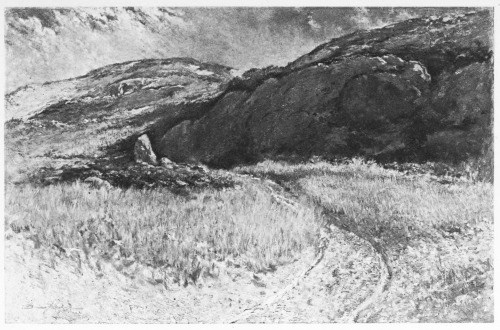
The Idyll of the Standing-Stone
They knew before they came to meet;For some divulging influenceHad touched them thro’ the starry lensGod holds to bring in beatTwo hearts—her heart one haunting wish,And his—forgetful of the fish,Her flower at his feet.
II
The sassafras twigs had just lit upThe yellow stars of their fragrant candles,And the dogwood brimmed each blossom-cupWith spring to its brown-tipped handles;When down the orchard, ’mid apple blooms—Say, ho, the hum o’ the honey-bee!—A glimpse of Spring in the sprinkled glooms?Or only a girl? with the warm perfumesBlown round her breezily.The maple, as red as the delicate flushOf an afterglow, was airy crimson;And the haw-tree, white in the wing-whipped hush,Gleamed cool as a cloud that the moonlight dims on;And under the oak, whose branches strung—Say, heigh, the rap o’ the sapsuckér!—Gray buds in tassels that sweetly swung,They stood and listened a bird that sung,As glad as the heart in her.Yellow the bloom of the rattle-weed,And white the bloom of the plum and cherry;And red as a stain the red-bud’s brede,And clover the color of sherry:And a wren sings there in the orchard drift,—And, ho! the dew from the web that slips!—And a thrush sings there in the woodland rift,Where he to his face her face doth lift,Her face with the willing lips.For a while they sat on the moss and grass,Where the forest bloomed a great wild garden;—Then the beam from the hollow—it seemed to pass,And the ray on the hills to harden,When she rose to go, and his joy fell flat;—And, heigh, the wasp i’ the pawpaw bell!—As she waved her hand—why, it seemed at that’Twas Spring’s own self he was gazing at,And the life of his life as well.III
The teasel and the horsemint spreadThe hillsides, as with sunset sown,Blooming along the Standing-StoneThat ripples in its rocky bed:There are no treasuries that holdGold yellower than the marigoldThat crowds its mouth and head.’T is harvest-time: a mower standsAmong the morning wheat and whetsHis scythe, and for a space forgetsThe labor of the ripening lands;Then bends, and through the dewy grainHis long scythe hisses, and againHe swings it in his hands.And she beholds him where he mowsOn acres whence the water sendsFaint music of reflecting bendsAnd falls that interblend with flows:She stands among the old bee-gums,—Where all the apiary hums,—Like some sweet bramble-rose.She hears him whistling as he leans,And, reaping, sweeps the ripe wheat by;She sighs and smiles and knows not why:—These are but simple country scenes:He whets his scythe again, and seesHer smiling near the hives of beesBeneath the flowering beans.The peacock-purple lizard creepsAlong the rail; and deep the droneOf insects makes the country loneWith summer where the water sleeps:She hears him singing as he swingsHis scythe; he thinks of other things—Not toil, and, singing, reaps.IV
Into the woods they went again,Over the wind-blown oats;Out of the acres of golden grain,In where the light was a violet stain,In where the lilies’ throatsWere brimmed with the summer rain.Hung on a bough a reaper’s hook,Over the wind-blown oats;A girl’s glad laugh and a girl’s glad look,And the hush and ripple of tree and brook,And a wild bird’s silvery notes,And a kiss that a strong man took.Out of the woods the lovers went,Over the wind-waved wheat;She with a face, where love was blent,Like to an open testament;He, from his head to feet,Dazed with his hope that was eloquent.Here how oft had they come to tryst,Over the wind-waved wheat!Here how oft had they laughed and kissed!Talked and tarried where no one wist,Here where the woods are sweet,Dim and deep as a dewy mist.V
Her pearls are blossoms-of-the-vale,Her only diamonds are the dews;Such jewels never can grow stale,Nor any value lose.Among the millet beards she stands:The languid wind lolls everywhere:There are wild roses in her hands,One wild rose in her hair.To-morrow, where the shade is warm,Among the unmown wheat she’ll stop,And from one daisy-loaded armOne ox-eyed daisy drop.She’ll meet his brown eyes, true and brave,With blue eyes, false yet dreamy sweet:He is her lover and her slave,Who mows among the wheat.When buds broke on the apple treesShe wore an apple-blossom dress,And laughed with him across the leas,And love was all a guess.When goose-plums ripened in the rain,Plum-colored was her gown of red;He kissed her in the creek-road lane—She was his life, he said.When apples thumped the droughty land,A russet color was her gown:Another came, and—won her hand?—Nay! carried off to town....When grapes hung purple in the hot,None missed her and her simple dress,Save one, whom, haply, she forgot,Who loved her none the less.When snow made white each harvest sheaf,He sought her out amid her show;Her rubies, redder than the leafThat autumn forests sow.Not one regret her shame reveals;She smiles at him, then puts him by;He pleads; and she? she merely steelsHer heart and—lives her lie.VI
And he returned when poppies strewedTheir golden blots o’er moss and leaf,—Blond little Esaus of the wood,So fair of face, of life so brief.—Did he forget?—Not he, in truth!—“No month,” he thought, “holds so much grace,No month of spring, such grace and youth,As the sweet April of her face.”In fall the frail gerardiaHung hints of sunset and of dawnOn root and rock, as if to drawHer lips, remind him of one gone:—Of one unworthy, in pursuitOf butterflies, who does not dreamA flower, broken by her foot,Sweeps, helpless, with her down the stream.SOME SUMMER DAYS
I
If you had seen her waiting thereAmong the tiger-lily blooms,—That sowed their jewels everywhereAmong the woodland gleams and glooms,—You had confessed her very fair,And sweeter than the wood’s perfumes.A country girl with bare brown feet,She waits, while day slopes down the deeps:The afternoon is dead with heat,And all the weary shadow sleepsLike toil, arm-pillowed in the wheat,Beside the scythe with which he reaps.There is no sound more distant thanThe cow-bell on the vine-hung hill;No nearer than the locust’s spanOf noise that makes the silence shrill:And now there comes a sun-browned manThrough tiger-lilies of the rill.Long will they talk: till, in the end,The clear west glows, the east grows pale;Until the glow and pallor blendLike moonlight on a shifting sail;And then he ’ll clasp her; she will bendHer head, consenting. Day will fail:The west will flame, then fade awayThrough heavy orange, rose, and red,And leave the heavens violet grayAbove a gypsy-lily bed:Then they will go; and he will saySuch words to her as none has said.A million stars the night will winAbove them; and one fireflyPulse like a tangled starbeam inThe cedar dark against the sky:Then he will lift her dimpled chinAnd take the kiss she ’ll not deny.And when the moon, like the great bookOf Judgment, golden with the lightOf God, lies open o’er yon nookOf darkest wood and wildest height,Together they will cross the brookAnd reach the gate and kiss good night.II
And now he wipes his hand alongThe beaded fire of his browHard toil has heated; and the strongFace flushes fuller health as nowHe fills his hay-fork to the prong,And, tossing it, again doth bow.And now he rests, and looks awayAcross the sun-fierce hills and meadsNo rolling cloud has cooled to-day;And from his face the brawny beadsDrip; and he marks the heaps of hay,The fields of corn, the fields of weeds.At last he sees the tempest buildBlack battlements along the west,Black breastworks that are thunder filled;And bares his brow; and on his chestThe sweat of toil is cooled; and stilledThe pulse of toil within his breast.A strong wind brings the odorous deathOf far hay-meadows, and the scentIs good within his nostrils’ breath:The mighty trees are bowed, that leantFor no man, as when Power saith“Bow down!” and stalwart men are bent.He laughs, long-gazing as he goesAlong the elder-sweetened lane:He feels the storm wind as it blowsAcross the sheaves of golden grain,And stops to pull one bramble-rose,And watch the swiftly coming rain.And there, ’mid locust trees, the farmDreams in a martin-haunted place:He marks the far-off streaks of stormThat, driven of the thunder, race:He sees his child upon her arm,And in the door his wife’s fair face.

